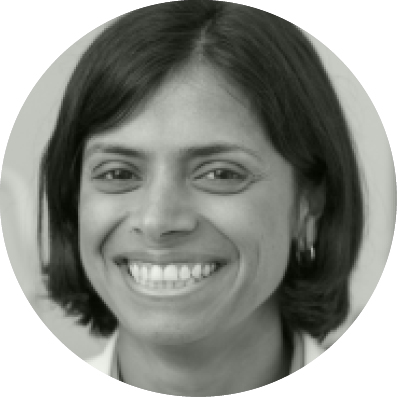supported by


Leela Raju, MD
Dr. Raju is the Chief of Service at Bellevue Hospital in New York, New York.
Please share with us your background.
I grew up in West Virginia, as my father had been recruited to join the West Virginia University Department of Ophthalmology. I went to college at Brown University, where I played varsity tennis and was on an Ivy League championship-winning squad my sophomore year. I went to medical school at Marshall University in Huntington, West Virginia, and then did a year of pathology with W. Richard Green, MD, at Wilmer before going on to residency at the University of Pittsburgh. I completed a cornea and external disease fellowship at Baylor and then returned to the University of Pittsburgh as faculty and also served as Vice-Chair of the ophthalmology department from 2011 to 2014. I then decided to see how the other half lived in private practice but have recently come back to academics.
What drew you to ophthalmology and, specifically, to your field of interest?
I, like many ophthalmologists, was introduced to the field by a family member: my father, V.K. Raju, MD. I used to go to the operating room with him when I was in high school and have seen him do international work since I was a kid. I think it speaks volumes that so many individuals in our profession have family members who were obviously very happy with their decision to pursue ophthalmology.
Please describe your current position.
I am the Chief of Service at Bellevue Hospital, where I have administrative duties in managing the clinic, teach residents, and see patients in our offices in Brooklyn Heights and Manhattan.
Who are/were your mentors?
My mentors include my father, who encouraged me with his dedication to service and constant striving to learn something new and grow as a physician; Joel Schuman, MD, who has given me some great opportunities and helped me develop as both a leader and an educator; and my fellowship attendings: Doug Koch, MD; Bowes Hamill, MD; Mitch Weikert, MD; Steve Pflugfelder, MD; and Liz Yeu, MD.
What has been the most memorable experience of your career thus far?
I strongly recommend participating in eye care in underserved areas of the United States or internationally. Through this experience, you can really feel like you are making an impact and improving quality of life for patients who may not have had access to care otherwise.
What are some new technological advances that you have found particularly exciting? Which advances in the pipeline are you most enthusiastic or curious about?
Lens technology continues to improve, and we are getting closer to truly being able to restore patients’ vision to what it once was—distance and reading. Corneal surgery, especially crosslinking, which is finally available in the United States, can make a great impact on patients with keratoconus who can’t afford contacts and do not yet require surgical intervention.
What is the focus of some of your research?
My research focuses primarily on herpes simplex virus and recurrence rates as well as on dry eye disease and digital media.
What is a typical day in your life? What keeps you busy, fulfilled, and passionate?
Participating in international work serves as a gut check for me. It reminds me why we do what we do and allows clinicians to get back to the practice of medicine and forget the bureaucratic rules or mandates that are often the cause for burnout. Teaching and helping young ophthalmologists navigate through residency and the first years of practice is also valuable to me.
What advice can you offer to individuals who are just now choosing their career paths after finishing residency or fellowship?
The first year can be a steep learning curve, but don’t forget your mentors who got you this far, and reach out. You often know more than you think, but you want to be careful to not assume you will know how to approach everything. Continue trying to learn something new, either diagnostic or treatment-wise (especially new surgical techniques); this keeps you thinking and helps you to be prepared when something unexpected happens in the OR—and it will as long as you are operating.
Tell us about an innovative procedure you are performing or a new imaging/diagnostic tool that has improved your practice.
The introduction of microinvasive glaucoma surgery (MIGS), even as a cornea surgeon, has helped me offer more options to my glaucoma patients who are having issues using drops. I find that MIGS can be incorporated into a cataract practice efficiently.


